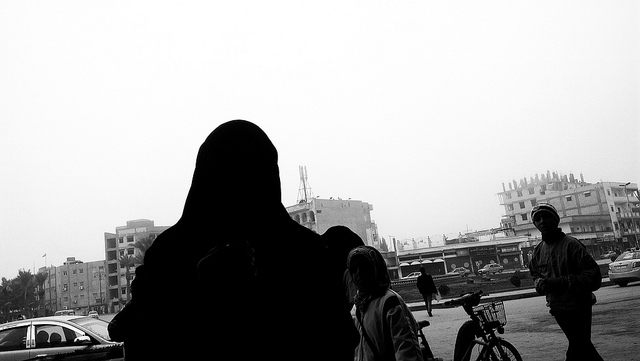
As US supported Syrian forces and their allies battle to retake Raqqa from ISIS, it’s important to remember what the city has become under ISIS rule. Raqqa became the capital of ISIS’s so-called caliphate and a stronghold for the terrorist group’s fighters—but also the hub of sexual and gender based violence, including infrastructure developed for the kidnap, transport, sale and
sexual enslavement of thousands of, mostly, Yazidi women.
Since ISIS seized control of
Raqqa in 2014, women have been among the worst affected by the group’s occupation. A woman sporting an uncovered face is a punishable offense, even if it’s just a photograph on a hair product packet. Women aren’t allowed out alone, they must be accompanied by a guardian at all times. If a taxi driver were to drive a woman on her own, he could be punished with 30 lashes. Women aren’t permitted to go to work or to school or university. And they have no access to sexual or reproductive health care.
On top of that, ISIS has also incorporated sexual violence into their authoritarian rule. Organisations including the United Nations and Human Rights watch have issued statements about ISIS’s use of sexual violence as a war crime, a crime against humanity and genocide. When sexual violence is perpetrated as part of an armed conflict, it’s a
war crime. When that violence is widespread or systemic, it’s a
crime against humanity. When it’s used to destroy, in whole or in part, an ethnic, racial or religious group, it’s
genocide.
Earlier this year during
a speech at the UN international human rights lawyer Amal Clooney noted that ‘there is still not one ISIS militant who has faced trial for international crimes anywhere in the world’. She said that the global response to ISIS shouldn’t be limited to the battlefield. And she insisted that the right parties should investigate ISIS’s crimes and ‘make sure that those responsible are brought to justice’.
Abduction, forced conversion and enslavement of women and girls—especially for sexual trafficking and forced marriage—have been key components of ISIS’s genocide against the Yazidis. Global Yazidi organisation Yazda has reported that ‘abducted women and girls were transported by bus…to slave markets in Raqqa, where they were displayed, sometimes naked and price-tagged’. Those women must be freed and evidence of these crimes needs to be preserved and documented, including by collecting survivor testimony in ethical and sensitive ways.
The
Commission of Inquiry on Syria recently reported to the Human Rights Council, that if successful, the current offensive for Raqqa ‘could liberate the civilian population from the oppressive clutches of ISIL, including Yazidi women and girls who had been kept sexually enslaved for almost three years as part of an ongoing and unaddressed genocide’. However,
when the battle to retake Mosul began last year, no operational considerations were made for the preservation of evidence of international crimes or even for the safety and release of thousands of Yazidi women held there as sex slaves.
To this day, very few of those held captive have been freed. Speaking on behalf of the Yazidi community, Nikki Marczak, Australia’s Director of Yazda, has urged that ‘as ISIS is defeated in and around Raqqa, a priority for authorities must be the rescue of those Yazidi captives, along with a strategy to ensure immediate access to medical assistance and long-term support.’
In 2014, much ado was made about the
Global Summit to End Sexual Violence in Conflict. Angelina Jolie and William Hague launched the
International Protocol on the Documentation and Investigation of Sexual Violence in Conflict. Australia’s own David Morrison
delivered a famous speech on gender violence within the military. However, that protocol is yet to be incorporated into conduct of multinational operations. Indeed, it has barely been incorporated into the operational conduct of national militaries.
The
General Assembly has taken an unprecedented step, establishing an ‘International, Impartial and Independent Mechanism’ (IIIM) to help investigate and prosecute the worst crimes under international law in the war in Syria. The IIIM goes a step further than previous efforts at investigating international crimes in the war against ISIS. For example, the Commission of Inquiry on Syria reported that genocide had been perpetrated by ISIS against the Yazidis. But the IIIM also establishes the connection between the crime
‘and the persons responsible, directly or indirectly’.
That’s the level of investigation required for countries like Australia and Britain to investigate and prosecute nationals for sexual violence as war crimes, crimes against humanity and genocide. Indeed, Australia’s Foreign Minister recently stated that ‘where an Australian is alleged to have committed one of these crimes, Australian authorities will investigate and, where appropriate, prosecute that individual regardless of where the crime was committed’. Australia’s support to operations in Iraq and Syria need to provide for the need to protect women and girls from sexual violence perpetrated by ISIS, to document and record ISIS crimes, and to investigate and prosecute the individuals responsible.
[2] Raqqa in 2014, women have been among the worst affected by the group’s occupation: http://www.news.com.au/world/middle-east/two-brave-women-carry-hidden-cameras-film-life-inside-islamic-stateheld-alraqqah-syria/news-story/1588c7a17147186ddbc615b2976ba490
[7] Commission of Inquiry on Syria recently reported to the Human Rights Council: http://reliefweb.int/report/syrian-arab-republic/human-rights-council-holds-interactive-dialogue-commission-inquiry-2
 Print This Post
Print This Post